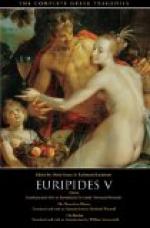Through the long leagues of
fiery blue,
With saving; not to souls unshriven;
But whoso in his life hath striven
To love things holy and be true,
Through toil and storm we
guard him; we
Save, and he shall not die!—Therefore,
O praise the lying man no more,
Nor with oath-breakers sail the sea:
Farewell, ye walkers on the shore
Of death! A God hath counselled ye.
[CASTOR and
POLYDEUCES disappear.
CHORUS.
Farewell, farewell!—But
he who can so fare,
And stumbleth not on mischief anywhere,
Blessed on earth is he!
NOTES TO THE ELECTRA
The chief characters in the play belong to one family, as is shown by the two genealogies:—
I.
TANTALUS | Pelops __________|__________________ | | Atreus Thyestes _________|__________ | | | | Agamemnon Menelaus Aegisthus (=Clytemnestra) (=Helen) (=Clytemnestra) _____|________________________ | | | Iphigenia Electra Orestes
(Also, a sister of Agamemnon, name variously given, married Strophios, and was the mother of Pylades.)
II.
Tyndareus = Leda = Zeus ____________________| ____|_________________________ | | | | Clytemnestra Castor Polydeuces Helen
P. 1, l. 10, Son of his father’s foe.]—Both foe and brother. Atreus and Thyestes became enemies after the theft of the Golden Lamb. See pp. 47 ff.
P. 2, l. 34, Must wed with me.]—In Aeschylus and Sophocles Electra is unmarried. This story of her peasant husband is found only in Euripides, but is not likely to have been wantonly invented by him. It was no doubt an existing legend—an [Greek: on logos], to use the phrase attributed to Euripides in the Frogs (l. 1052). He may have chosen to adopt it for several reasons. First, to marry Electra to a peasant was a likely step for Aegisthus to take, since any child born to her afterwards would bear a stigma, calculated to damage him fatally as a pretender to the throne. Again, it seemed to explain the name “A-lektra” (as if from [Greek: lektron] “bed;” cf. Schol. Orestes, 71, Soph. El. 962, Ant. 917) more pointedly than the commoner version. And it helps in the working out of Electra’s character (cf. pp. 17, 22, &c.). Also it gives an opportunity of introducing the fine character of the peasant. He is an [Greek: Autourgos] literally “self-worker,” a man who works his own land, far from the city, neither a slave nor a slave-master; “the men,” as Euripides says in the Orestes (920), “who alone save a nation.” (Cf, Bac., p. 115 foot, and below, p. 26, ll. 367-390.) As Euripides became more and more alienated from the town democracy he tended, like Tolstoy and others, to idealise the workers of the soil.




